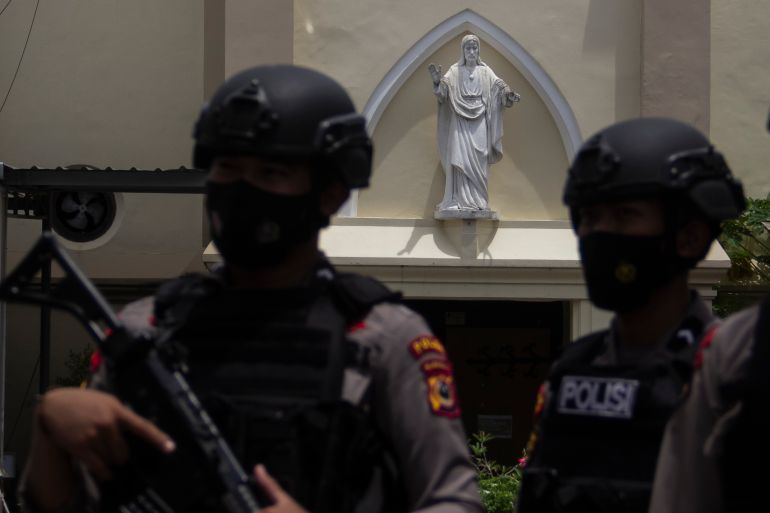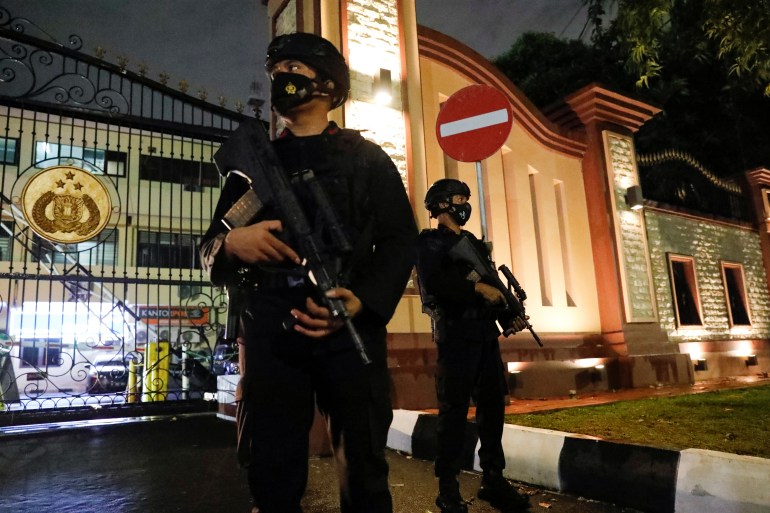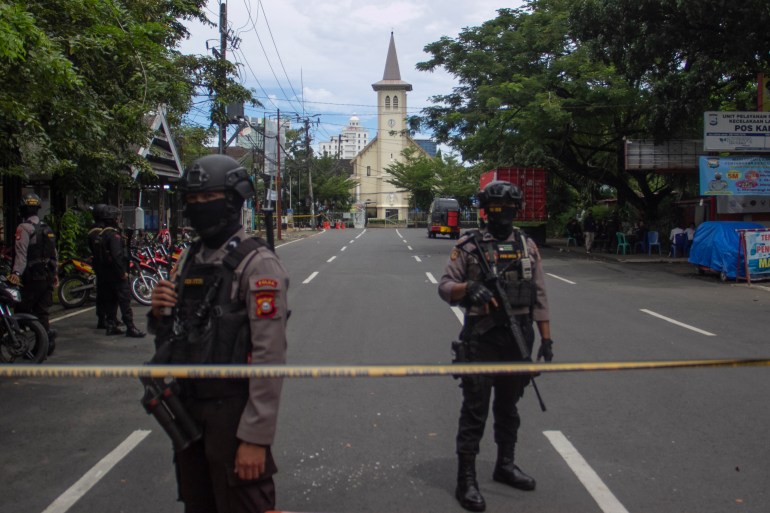Indonesia on edge ahead of Easter after church bombing
World’s most populous Muslim country is on alert for attacks after Makassar cathedral, police headquarters targeted.

Makassar and Medan, Indonesia – Christian communities across Indonesia are bracing for further attacks ahead of Easter Sunday following a suicide bombing at the Sacred Heart of Jesus Cathedral in Makassar, Sulawesi on Palm Sunday, which marks the start of the Christian Holy Week.
“We invite all Catholics and Protestant congregations in Indonesia and around the world to pray for the Indonesian people facing challenges including terrorism and the COVID-19 pandemic in the lead up to Easter.” the head of Indonesia’s Batak Christian Protestant Church (HKBP), Bishop Robinson Butarbutar told Al Jazeera following the attack.
Keep reading
list of 4 itemsMakassar Palm Sunday bomber was known to Indonesian police
Suicide attack targets Indonesia church
Indonesian schoolgirls ‘bullied’ into religious clothing: Report
“Let us reflect on Jesus Christ’s crucifixion and resurrection as we continue our work to bring love and peace to all Indonesian people. We ask congregations to increase their vigilance ahead of the Easter season and work with the local authorities and the Indonesian police.”
Christians are considered a minority group in Indonesia where about 87 percent of the population is Muslim. There are about 23 million Christians in Indonesia out of a total population of 270 million.
Indonesia has a history of attacks on houses of worship, including a spate of church bombings on Christmas Eve 2000, which targeted cities including the capital Jakarta, as well as Medan in Sumatra and Batam, in the Riau islands just south of Singapore, and were carried out by the hardline group Jemaah Islamiyah (JI) which was also responsible for the 2002 Bali bombing.
In 2018, three churches in the city of Surabaya were attacked by suicide bombers from the group Jamaah Ansharut Daulah (JAD) leaving 28 people dead. The suicide bombers included a husband and wife as well as their three children, the youngest of whom was nine years old.
Noor Huda Ismail, a former member of the hardline group Darul Islam who has since founded the Institute for International Peace Building and runs deradicalisation programmes and workshops across Indonesia, told Al Jazeera that “The party isn’t over yet” and that the recent spate of attacks would probably continue over the Easter period and during the Muslim holy month of Ramadan, which starts on 12 April, due to the religious significance of both events.

Even though Ramadan is viewed by many as a peaceful month in which Muslims fast from sunrise to sunset, Huda said that extremist groups “like to ‘hijack’ Islamic history where the Prophet conducted raids or wars during Ramadan”.
The Battle of Badr in 624 was waged by the Prophet during the month of Ramadan, as was the conquest of Mecca in 629 according to Islamic history.
On Wednesday, police shot dead an attacker in a blue headscarf who entered the National Police Headquarters in Jakarta brandishing a handgun.
Saved by guard
Many churches across the archipelago already employ security guards, with local police providing additional support around main holidays in the Christian calendar such as Easter and Christmas.
One such private security guard employed at the Sacred Heart of Jesus Cathedral in Makassar, is now being hailed as a hero after stopping the two suicide bombers, who were on a motorbike, from entering the cathedral grounds.
“Cosmas sustained injuries to his body and ringing in his ears,” said Pastor Tulak, one of the priests at the Cathedral who had just performed morning mass and was resting in his chambers at the time of the attack.
“Cosmas is not the main security guard at our church, but he always helps when there are large celebrations. His father was a security guard at the church before him.”
Tulak told Al Jazeera that 51-year-old Cosmas had seen two people on a motorbike loitering in front of the south gate of the church. When the motorbike approached, Cosmas told the driver that he was not allowed to enter the church grounds.
“Unfortunately, that is when the bomb exploded,” added Tulak.
Armin Hari was about 300 metres (984 feet) away from the explosion, waiting for the result of a COVID-19 rapid swab test at a local clinic, when he heard a loud thud which he originally mistook for a transformer exploding.
“Then I heard people around me panicking and saying something about a bomb,” he told Al Jazeera. Armin says that he saw teeth scattered on the ground and what looked like mutilated organs. “I think it was a liver and some lungs, or something like that,” he said.
The blast injured 19 people and killed the two suspected suicide bombers, thought to be a husband and wife who had married seven months ago.
Indonesia’s National Police Chief Listyo Sigit Prabowo said that the attackers were part of the Jamaah Ansharut Daulah (JAD) network which was declared a terrorist organisation by the United States in 2017 and banned in Indonesia in 2018.
A former member of JAD, speaking on the condition of anonymity, who was part of the group in West Java, told Al Jazeera that JAD is an offshoot of the ISIL (ISIS) group.

“Simply put, the JAD ideology means you supported Abu Bakr al-Baghdadi and pledge to carry out all directions from ISIS leaders. You are taught to be hostile to infidels and all rulers who do not want to apply Islamic law. According to ISIS, this is the perfect religion.”
He added: “The attack on the church in Makassar followed a similar pattern to the church attacks in Surabaya in 2018. When I was a member of JAD, I was also ordered to carry out surveillance on a temple in Surabaya and plan an attack there. However, there were too many obstacles to the plan so it fell through. Places of worship have become JAD’s favourite target because they are weakly guarded and there is greater likelihood of mass casualties as opposed to police or military targets.”
In the city of Medan, North Sumatra, which has a large Christian population, local priest and the head of the Simalingkar branch of HKBP, Sabar Simaremare, told Al Jazeera that, “At the moment, we do not feel scared because we have a caring and harmonious community around us. But we have previously had security provided by the police and we will request it again this Easter.”
“We want all our brothers and sisters to keep safe at this time. We hope we can still pray together, we are humans too.”